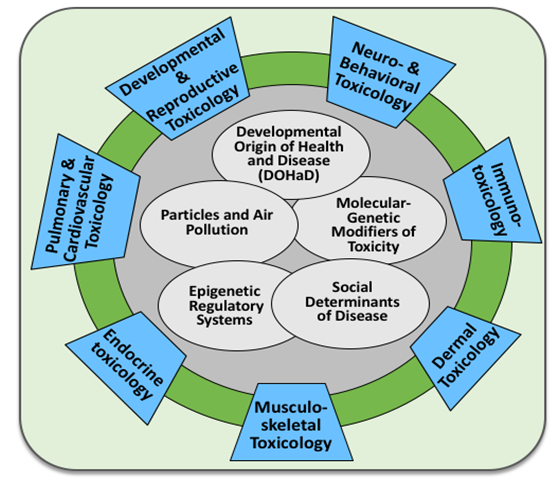About the Program
The environment has a tremendous impact on our health and overall well-being. However, precisely how environmental factors affect our health, and how negative consequences can be prevented or overcome remain largely unknown. Advanced training in toxicology is ideal for someone who is excited about biomedical science, and wants to directly apply new discoveries in basic biology to a better understanding of how the environment influences the development, progression, and prevention of human diseases and disorders.
While housed administratively in the Department of Environmental Medicine, the Toxicology training program is interdisciplinary, with faculty mentors in over 13 different basic science and clinical departments and divisions at the University of Rochester. We invite you to browse our detailed descriptions of faculty mentors and their research, as well as links to publications.
Opportunities in our program span basic and clinical research to discover how the environment affects human health, and how to use this information to improve individual and community health. Trainees in our program have the opportunity to conduct state-of-the art research on themes including Developmental Origins of Health and Disease, Molecular-Genetic Modifiers of Toxicity, Social Determinants of Disease, Epigenetic Regulatory Systems, and Particles and Air Pollution within these keystone areas of research:
- Neuro- and Behavioral Toxicology ˜ How certain pollutants affect risk for behavioral disorders and contribute to neurodegenerative diseases, such as Parkinson’s and Alzheimer’s disease
- Pulmonary and Cardiovascular Toxicology ˜ How common environmental exposures affect the development of asthma, chronic obstructive pulmonary disease, and other lung diseases
- Musculoskeletal Toxicology ˜ How environmental chemicals alter bone formation and healing, contribute to osteoporosis and osteoarthritis
- Immunotoxicology ˜ How chemical exposures may contribute to poorer ability to fight infections and increase immune-mediated diseases
- Developmental and Reproductive Toxicology ˜ How early life exposures (in utero or shortly after birth) set the stage for disease later in life, including how these exposures alter epigenetic regulatory mechanisms
- Dermal Toxicology ˜ How chemical exposures may contribute to skin barrier dysfunction and immune regulation
- Endocrine Toxicology ˜ How chemical exposures – particularly endocrine disrupters – may affect the function of organ systems that regulate all of the body’s biological processes

Other Key Attributes of Our Program
- All Ph.D. students receive a stipend to support living expenses for the duration of their studies.
- A single health care plan is provided for graduate students and postdoctoral fellows. Tuition costs are covered for all students.
- A full-time Program Coordinator
- A rigorous combination of didactic and practical experiences provide trainees with an outstanding foundation and the tools to succeed
- The Department of Environmental Medicine administers National Institute of Environmental Health Science (NIEHS) Center Grant and a Toxicology Training Grant. These bring additional resources that further enrich the overall environment for students and postdoctoral fellows in our Toxicology training program, such as research retreats, funds to travel to scientific conferences, opportunities to hone teaching skills, and get involved in community outreach and science education.
- A rich environment in a world-class academic medical center. The diversity, richness, and complementary nature of research and training among all of the graduate programs provide opportunities for Toxicology program students and post-doctoral fellows to focus on their chosen research in a collaborative and invigorating setting.
How To Apply
History of Toxicology at URMC
 The University of Rochester has a long history as an internationally recognized center for research and training in toxicology. The genesis of toxicology at Rochester can be traced back to World War II when the Manhattan Project sponsored critical studies on health problems associated with atomic energy and weapons production.
The University of Rochester has a long history as an internationally recognized center for research and training in toxicology. The genesis of toxicology at Rochester can be traced back to World War II when the Manhattan Project sponsored critical studies on health problems associated with atomic energy and weapons production.
To read more about the history of the Toxicology program, please read Toxicology at the University of Rochester: From the Manhattan Project to the Environmental Basis of Human Diseases, by Ballatori, Laties, and Gasiewicz.